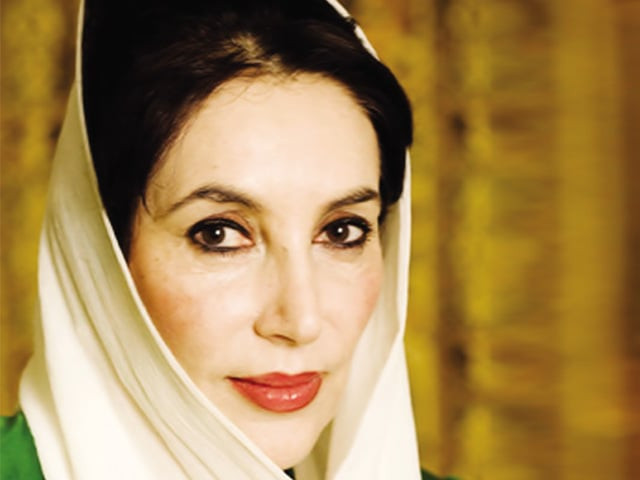Your scent lingers on
Today, on the 72nd anniversary of Shaheed Bibi, we deeply miss her presence.

June 21 marks the birth anniversary of Shaheed Mohtarma Benazir Bhutto (Shaheed Bibi). She was born on June 21, 1953, in Karachi.
On that day, her father, Shaheed Zulfikar Ali Bhutto, her mother, Begum Nusrat Bhutto, and the entire Bhutto family celebrated the immense joy her birth brought them. Shaheed Bhutto described this moment in detail in a letter he wrote to Shaheed Bibi on her 25th birthday, June 21, 1978, while on death row in Rawalpindi Jail. This letter was later published in book form under the title My Most Beloved Daughter.
In this letter, Shaheed Bhutto wrote that Shaheed Bibi was a deeply compassionate and sensitive child, so much so that she once cried the whole day and refused to eat after a pigeon died. To this same daughter, on her birthday, he gifted her “the hand of the people,” saying he had nothing else to give from his death cell.
This remarkably kind-hearted Shaheed Bibi went on to confront some of the most ruthless and heartless colonial forces in the world to uphold that gift. She ultimately sacrificed her life for Pakistan and its people at the age of just 54.
Shaheed Bibi once wrote that during her final meeting with her father, a day before his execution, she promised him that she would carry forward his mission. After making this solemn vow to Shaheed Baba, she dedicated the next 30 years of her life to fulfilling it, enduring immense hardships and suffering until her martyrdom.
What was Shaheed Bhutto’s mission? Shaheed Bibi carried it forward as a well-defined program. His mission was to empower the people by giving them the right to make all decisions through democracy and to make the defense of the state of Pakistan impregnable. Shaheed Bhutto firmly believed that no democratic or political system can thrive in a militarily weak state. This was the essence of Shaheed Bhutto’s philosophy.
In light of recent Indian aggression against Pakistan and Israeli aggression against Iran, the importance of this philosophy is becoming increasingly clear. Democracy and the struggle for a strong, stable state must go hand in hand. The way Shaheed Mohtarma Benazir Bhutto advanced this mission is truly unparalleled.
The era of Shaheed Mohtarma Benazir Bhutto was marked by immense challenges, not only for the democratic forces of Pakistan but also for the security and sovereignty of the nation. Shaheed Bibi not only revived democracy by leading a peaceful yet determined struggle against two military dictators, but she also took extraordinary steps to strengthen Pakistan’s defence.
Today, on her birth anniversary, it is the most fitting moment to acknowledge and honour the exceptional contributions Shaheed Bibi made toward making Pakistan’s defence impregnable. It is widely recognised that Shaheed Zulfikar Ali Bhutto was the political architect of Pakistan’s nuclear program, while Shaheed Mohtarma Benazir Bhutto played the key role as the political architect of Pakistan’s modern missile program.
She not only safeguarded her father’s nuclear legacy but actively advanced it. In 1974, when India conducted its first nuclear test, Shaheed Zulfikar Ali Bhutto finalised Pakistan’s nuclear program. Similarly, in 1988, after India tested its Prithvi missile, Shaheed Mohtarma Benazir Bhutto took decisive steps to make Pakistan’s nuclear deterrent operational and viable.
Just as Shaheed Bhutto used his diplomatic channels to acquire nuclear technology from France and other countries, Shaheed Bibi skillfully engaged with North Korea and China to obtain missile technology. In 1989, as Prime Minister, she established the Missile Technology Board, obtained blueprints from North Korea, and signed multiple defense agreements. It was during her tenure that Pakistan’s Hatf missile program was launched and successfully tested.
Moreover, the defence agreements she signed with China gave Pakistan a strategic edge over India in military technology, an advantage that endures to this day. When India exhibited aggression, Pakistan, under her guidance and legacy, responded in kind, leaving a mark India would not forget.
The most meaningful way to pay tribute to Shaheed Mohtarma Benazir Bhutto on her birth anniversary is to recognise and salute her unparalleled efforts in fortifying the defence of Pakistan.
The Pakistan Peoples Party is the only political party in the country whose leadership has sacrificed their lives not only for the cause of democracy but also for the security and sovereignty of the state of Pakistan.
During her exile, in a conversation with journalists in Washington in March 2005, Shaheed Mohtarma Benazir Bhutto said: “My father laid the foundation of Pakistan’s nuclear program. I brought missile technology from North Korea. I signed defense agreements with China. I am told that I am the only one who can secure modern weapons for Pakistan from other countries, I am the one who can bring F-16s from the United States and Mirage jets from France. But what have they done to us? The whole world knows. Still, despite all the hardships, we will not give up our struggle to restore democracy in Pakistan, nor will we abandon our mission to strengthen its security and defense. We live and die for Pakistan and its people. Even in exile, I am doing more for Pakistan through diplomacy than those in power.”
These words reflect not only her unwavering dedication to democratic ideals but also her tireless efforts to ensure Pakistan’s strategic strength, even when far from home, under pressure, and in exile.
Shaheed Bibi clearly advanced the mission of her Shaheed Baba through her actions. This mission encompassed both the democratic rights of the people of Pakistan and the security of the state. Today, that same mission is being carried forward by Shaheed Bibi’s son and Pakistan Peoples Party Chairman, Bilawal Bhutto Zardari. Just as he continues to raise the flags of Pakistan’s victories on the diplomatic front, he is upholding the core agenda of the mission begun by Shaheed Bhutto and Shaheed Bibi.
Today, on the 72nd anniversary of Shaheed Bibi, we deeply miss her presence. As Ghalib beautifully expressed, “Aisa kahan se laaun ke tujh sa kahin jise” — Where could I find someone like you, whom I could call ‘like you’? Shaheed Bibi used to say that a person can be imprisoned or exiled, but an ideology cannot be. We continue to uphold this belief—that a person may be imprisoned, exiled, or even killed, but an ideology will always survive.
The ideology of reconciliation that Shaheed Bibi championed for Pakistan and its people, as an alternative to revenge, will forever endure. As the poet says…
(Tere baad bhi guzray hain kuch log
Magar teri khushboo na gayi reh guzar se)
Even after you, some people did pass by,
But your fragrance never left the path.
























COMMENTS
Comments are moderated and generally will be posted if they are on-topic and not abusive.
For more information, please see our Comments FAQ